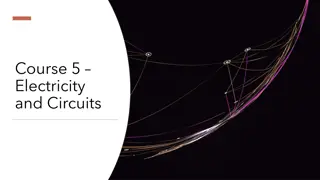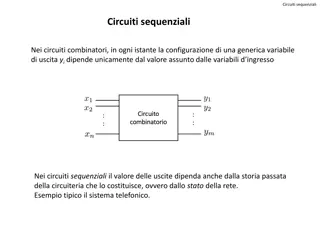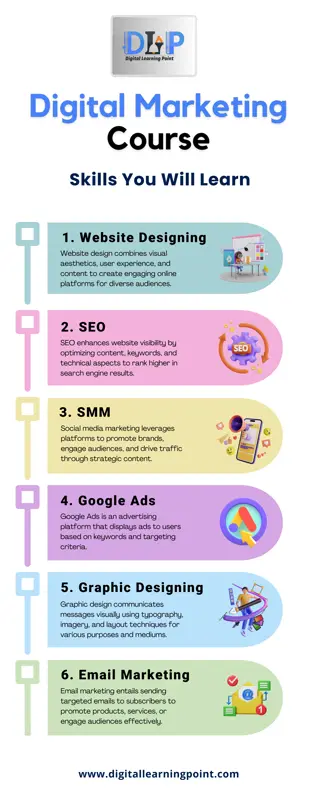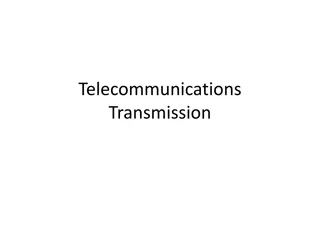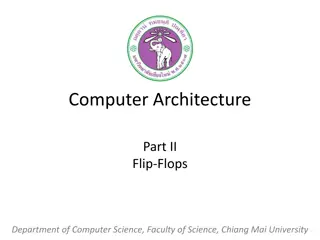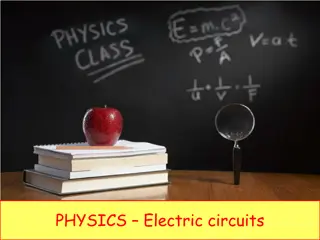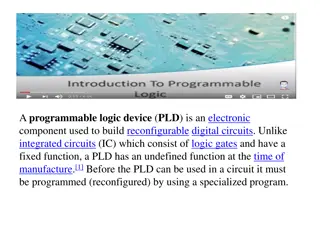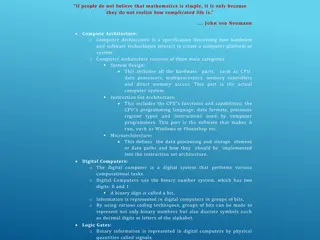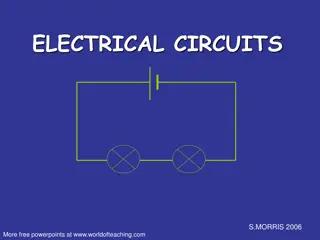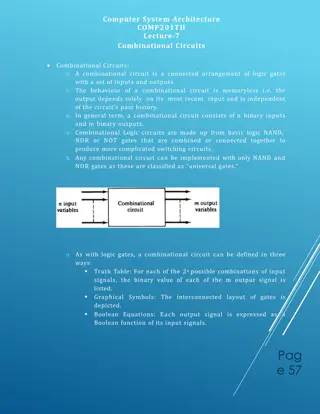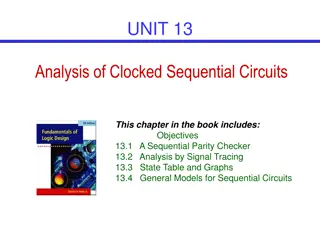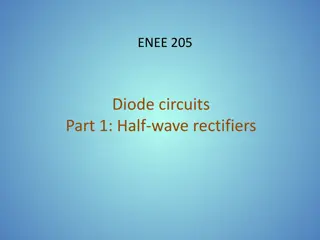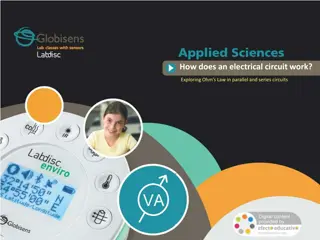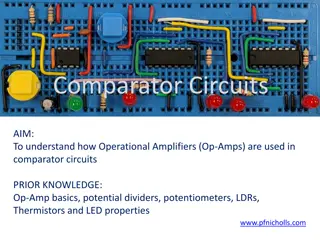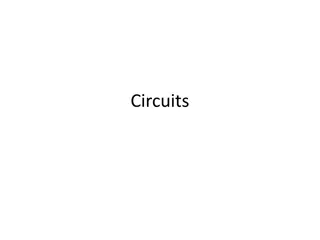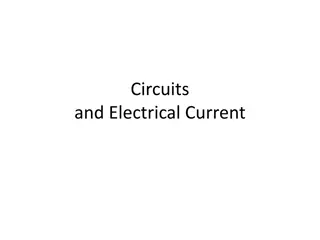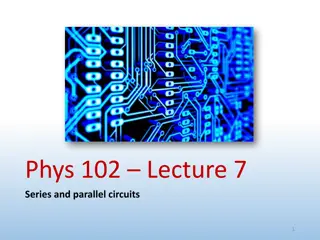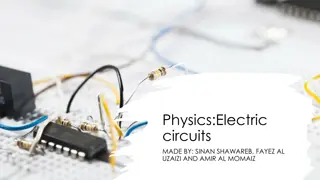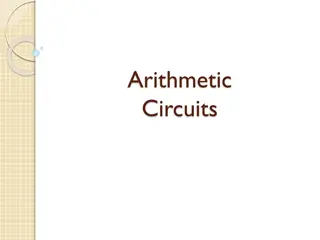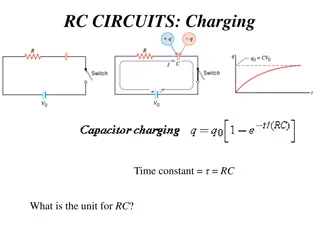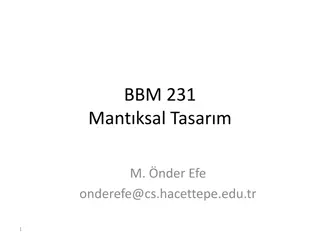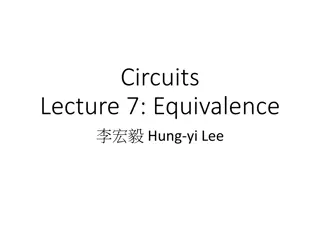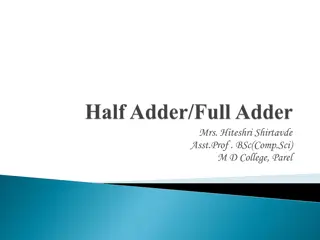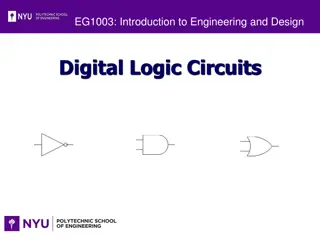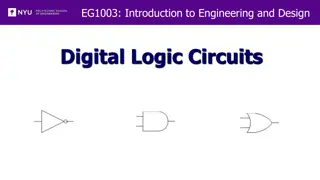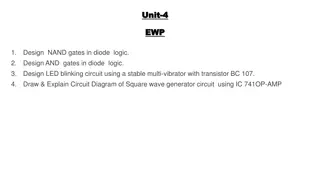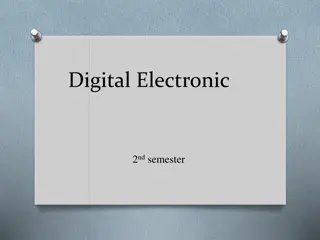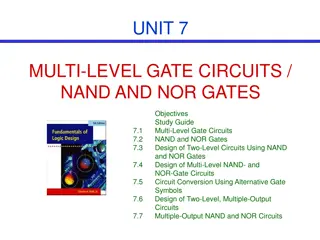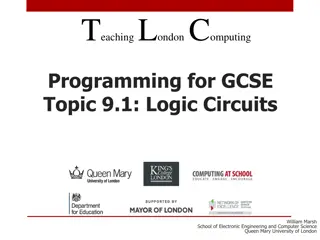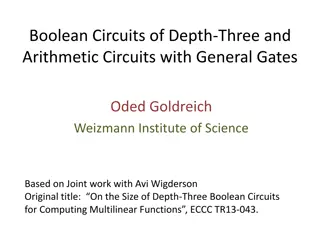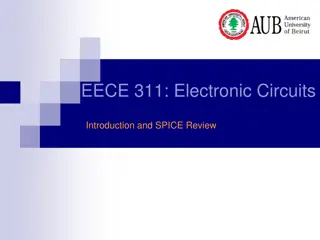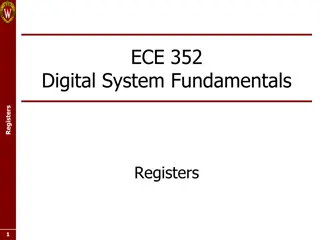Digital Competency Maturity Model 2.0 for Accounting Firms - Overview and Implementation
The Digital Competency Maturity Model 2.0 (DCMM 2.0) is a framework designed to help professional accounting firms evaluate and enhance their digital competencies. Released as an upgrade to the previous version in 2017, DCMM 2.0 offers a structured approach for firms to assess their current level of
4 views • 19 slides
Understanding Electricity and Circuits: Basics, Components, and Applications
This educational course covers topics such as circuit symbols, calculating and measuring electrical quantities, identifying circuits, and understanding the relevance of electricity in engineering. It explains essential circuit components like energy sources, conductors, insulators, loads, control de
12 views • 30 slides
Understanding Sequential Circuits: A Brief Overview
Sequential circuits differ from combinational circuits in that the output depends not just on the current input but also on the circuit's past history. This overview covers the basics of sequential circuits, including finite-state automata, states, transitions, and memory elements like flip-flops.
2 views • 50 slides
Understanding Sequential Logic Circuits in Digital Systems
Logic circuits in digital systems can be either combinational or sequential. Sequential circuits utilize storage elements along with logic gates, where outputs depend not only on present inputs but also on past inputs and internal states. They are essential building blocks, with storage registers pl
5 views • 20 slides
Digital Learning Point
Digital Marketing is a profoundly unique field where procedures and patterns develop rapidly. Join Digital Learning Point for the best digital marketing course in Haldwani, and we will help you to know each and every aspect of Digital marketing.\n\nDigital marketing course in Haldwani | Digital mark
7 views • 1 slides
Understanding Telecommunications Transmission Systems
Transmission systems in telecommunications provide circuits between network nodes using channels for bidirectional communication. Channels can range from simple audio circuits to complex satellite systems. Signals can be analog or digital, each with its unique characteristics. Bandwidth is crucial f
0 views • 32 slides
Understanding Combinational Circuits in Computer Architecture
Combinational circuits in computer architecture play a crucial role in transforming binary information from input data to output data. These circuits consist of logic gates connected in a specific arrangement to process binary data efficiently. Key components such as half-adders and full-adders are
1 views • 48 slides
Comprehensive Guide to Electric Circuits and Circuit Diagram Interpretation
Explore the fundamentals of electric circuits, circuit components, and diagram interpretation. Learn about series and parallel circuits, resistors, sources, switches, transducers, and more. Discover how to calculate resistance, current, and potential difference in circuits. Gain insights into diodes
2 views • 76 slides
Understanding Programmable Logic Devices (PLD) in Digital Electronics
Programmable Logic Devices (PLDs) are versatile electronic components used to create reconfigurable digital circuits, distinct from fixed-function integrated circuits. PLDs require programming before use, enabling customization for specific functions. This article explores PLDs, digital electronic s
0 views • 10 slides
Understanding Computer Architecture and Digital Circuits
Computer architecture encompasses system design, instruction set architecture, and microarchitecture, defining how hardware and software interact to create a computer platform. Digital computers operate using the binary number system and logic gates to process information. Hardware description langu
2 views • 8 slides
Understanding Electrical Circuits: Basics and Types
The presentation covers the basics of electrical circuits, explaining the concept of electric current, the role of cells and batteries, simple circuit components like switches and lamps, and circuit diagrams. It further delves into types of circuits - series circuits and parallel circuits, detailing
0 views • 24 slides
Understanding Combinational Circuits in Digital Systems
Combinational circuits in digital systems consist of logic gates interconnected to process input signals and produce output based solely on the current input, without any memory. They are implemented using basic logic gates like NAND, NOR, or NOT gates, which can be combined to create complex switch
0 views • 5 slides
Analysis of Clocked Sequential Circuits and Parity Checkers
This chapter delves into the analysis of clocked sequential circuits, focusing on topics such as sequential parity checkers, signal tracing, state tables and graphs, and models for sequential circuits. It covers concepts like Mealy and Moore machines, state equations, state graphs, timing charts, an
0 views • 38 slides
Digital Skills Pack March 2021 Overview
This document provides insights into the demand for digital skills in various industries, focusing on the West of England region. It analyzes digital career pathways, skills demanded, and labor market trends. The report highlights the growth of the Digital Sector, key skills for digital jobs, and wa
1 views • 39 slides
Understanding Diode Circuits: Half-Wave Rectifiers and Full-Wave Rectifiers
Diode circuits play a crucial role in converting AC signals to DC signals. This article covers the basics of diodes, half-wave rectifiers, and full-wave rectifiers. It explains the functioning of unfiltered and filtered rectifier circuits, highlighting the differences in ripple effects and voltage r
6 views • 18 slides
Understanding Electrical Circuits and Ohm's Law
Electric circuits play a crucial role in our daily lives, powering various devices and appliances. This activity delves into Ohm's Law in parallel and series circuits, exploring the flow of electric current and the transformation of electrical energy into different forms. Through hands-on experiment
0 views • 31 slides
Understanding Operational Amplifier (Op-Amp) Comparator Circuits
Operational Amplifiers (Op-Amps) are commonly used in comparator circuits to convert analog inputs to digital outputs. In comparator circuits, the Non-Inverting input being higher or lower than the Inverting input determines whether the output is ON or OFF. Real comparators like the 741 or 081 have
1 views • 14 slides
Understanding Circuits: Exploring Requirements, Function, and Analogies
Delve into the world of circuits by learning about their requirements, functions, and different types. Discover how circuits work, their components like bulbs and batteries, and explore analogies like comparing circuits to water parks. Gain insights into the flow of electrons and the essential laws
0 views • 47 slides
Exploring Electric Circuits in Grade 6 Natural Sciences and Technology
Dive into the world of electric circuits with Grade 6 students as they learn about circuit diagrams, different configurations involving cells, bulbs, and switches. The images provide visual examples of circuits with varying components, encouraging students to identify differences and understand how
0 views • 8 slides
Exploring Circuits and Electrical Current: Essential Concepts and Experiments
Dive into the world of circuits and electrical current with a focus on understanding the requirements, components, and functioning of circuits. Explore essential questions, experiment with building circuits, and grasp the basics of how electricity flows through a circuit. Discover the different type
0 views • 54 slides
Electric Circuits: Series and Parallel Configurations Explained
In this lecture on electric circuits, we delve into series and parallel circuits featuring batteries, wires, resistors, and capacitors. Key concepts discussed include Kirchhoff's loop rule, series components, and equivalent resistance and capacitance. Learn how to simplify complex circuits and analy
0 views • 24 slides
Understanding Electric Circuits: Basics and Examples
An exploration of electric circuits, including their components, symbols, and the flow of current. Learn about examples of electric circuits used in devices like televisions and loudspeakers. Test your knowledge with questions on circuit symbols, the definition of an electric circuit, and examples o
0 views • 11 slides
Understanding Combinational Circuits in Digital Electronics
Combinational circuits are an essential component of digital electronics, combining different gates to perform specific functions without memory usage. They provide outputs based solely on present input levels, with no influence from previous states. Types of combinational circuits include half adde
0 views • 55 slides
Applications of RC Circuits in Electronics and Biomedical Devices
RC circuits play a crucial role in various applications such as camera flashes, timing devices in automobiles, and heart pacemakers. These circuits involve charging and discharging a capacitor through a resistor, controlling voltage pulses for precise timing. In devices like camera flashes, the flas
0 views • 7 slides
Digital Electronic Circuit Design: BBM 231 Lecture Information
This content provides detailed information about the BBM 231 course covering topics such as lecture schedules, lab sections, grading criteria, lab assistants, contact information, motivation behind studying digital circuits, characteristics of digital systems, representation in electronics circuits,
0 views • 23 slides
Lower Bounds on Sampling Good Codes in Bounded-Depth Circuits
Bounded-depth circuits are proven unable to sample or approximate good codes effectively. This work delves into lower bounds, showcasing that bounded families of circuits face limitations in computing specific functions or sampling distributions. The example of Parity in AC0 circuits illustrates the
0 views • 21 slides
Impact of Digital Communication on Social Inequality
The impact of digital forms of communication in a global context highlights the existence of a digital divide based on social inequality, particularly regarding access to information and communication technologies. This digital gap is evident within countries like the UK, where disparities exist bet
2 views • 12 slides
Understanding Integrated Circuits: Fabrication and Packaging Technology
Integrated circuits are fabricated on silicon wafers using a photographic process. The resolution of this process determines the number of devices that can be integrated onto a single chip. After fabrication, the wafer is tested, diced, and functional die are packaged using aluminum or gold wires. T
0 views • 11 slides
Understanding Equivalent Networks in Circuits
Explore the concept of equivalent networks in circuits, detailing how they simplify complex circuits, along with comparisons to programming functions. Delve into the parallels between circuit design and programming, highlighting the importance of structuring circuits like functions. Discover the ben
0 views • 50 slides
Understanding Electric Circuits in Grade 6 Science
Explore the world of electric circuits in Grade 6 Natural Sciences and Technology. Learn about components like cells, conductors, light bulbs, and switches. Discover how symbols represent these elements and see examples of circuits with different configurations. Get familiar with crocodile clips for
0 views • 9 slides
Understanding Half Adders and Full Adders in Combinational Logic Circuits
Half adders and full adders are essential components in combinational logic circuits for performing addition operations on binary numbers. While half adders can add two single-bit numbers but do not consider carry bits, full adders can handle three bits with carry input. Understanding the input and
0 views • 9 slides
Understanding Digital Logic Circuits: A Comprehensive Overview
Delve into the world of digital logic circuits with a focus on logic gates, truth tables, Boolean equations, and Karnaugh Maps. Explore the concepts of AND, OR, NOT gates, along with practical applications such as ATM machine operations. Gain insights into designing combinational logic circuits and
0 views • 28 slides
Understanding Digital Logic Circuits and Design Principles
Explore the world of digital logic circuits with a focus on logic gates, truth tables, boolean equations, and Karnaugh maps. Learn how to design combinational logic circuits, analyze different logic functions, and solve sample problems related to digital logic. Get hands-on experience with LabVIEW a
0 views • 28 slides
Exploring Diode and Transistor Logic Circuits for LED Blinking and Logic Operations
Dive into the world of diode and transistor logic circuits with designs for NAND and AND gates, as well as LED blinking circuits using stable multi-vibrators. Learn how these circuits function and discover the components involved in creating a square wave generator. Explore the practical application
0 views • 9 slides
Introduction to Digital Electronic Circuits and Logic Gates
Understanding digital electronic circuits and logic gates is essential for building digital systems. This content covers the basics of logic gates, digital signals, and the practical application of binary digits in circuits. It discusses the function and importance of logic gates, such as NOT gates
0 views • 17 slides
Design of Multi-Level Gate Circuits Using NAND and NOR Gates
Explore the design and analysis of multi-level gate circuits using NAND and NOR gates, including two-level and multiple-output circuit design. Learn about circuit conversion, alternative gate symbols, AND-OR, OR-AND configurations, and factorization of multi-level gate circuits. Dive into examples a
0 views • 28 slides
Understanding Logic Circuits in Computer Architecture
Explore the world of logic circuits through this comprehensive guide. Learn about logic gates, truth tables, and how computers are built from these components. Discover the basics of logic gates like AND, OR, and NOT, and delve into connecting gates to create functional circuits. Enhance your unders
0 views • 20 slides
Depth-Three Boolean Circuits and Arithmetic Circuits: A Study on Circuit Complexity
Explore the intricacies of depth-three Boolean circuits and arithmetic circuits with general gates, focusing on the size, structure, and complexity measures. The research delves into the relationship between circuit depth, gate types, and multi-linear functions, offering insights into circuit models
0 views • 12 slides
Electronic Circuits Introduction and SPICE Review Course Information
This course, EECE 311, provides an in-depth exploration of electronic circuits, covering topics such as BJT and MOSFET amplifiers, feedback systems, operational amplifiers, oscillators, and digital CMOS circuits. Students will gain knowledge on amplifier characteristics, frequency response, and the
0 views • 8 slides
Understanding Registers in Digital System Design
Registers play a vital role in digital systems by storing multi-bit binary data and facilitating various operations. They are essential for designing counters, accumulators, and circuits. Designing circuits with registers involves a divide and conquer approach, separating datapath and control unit c
0 views • 13 slides

